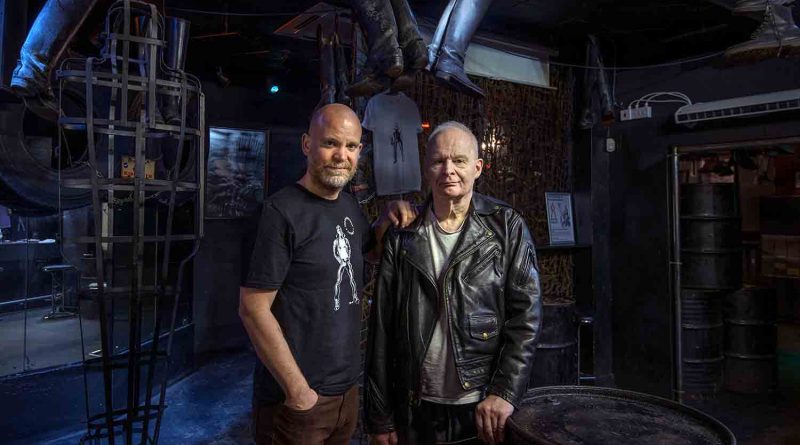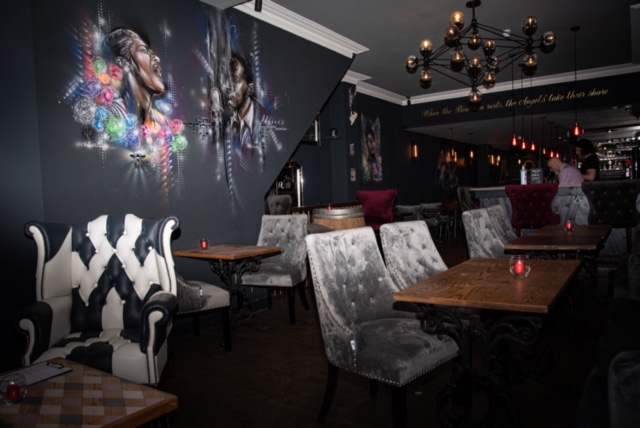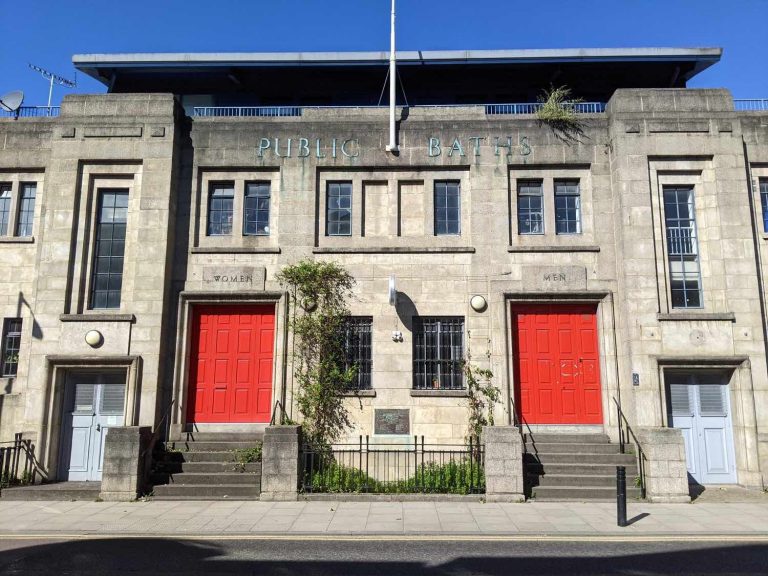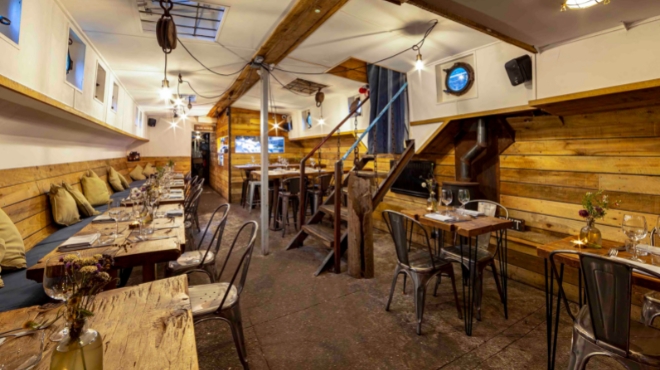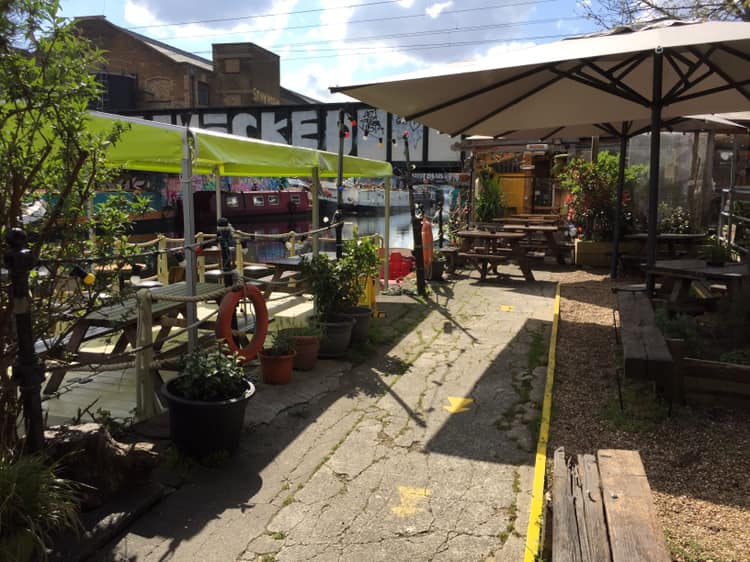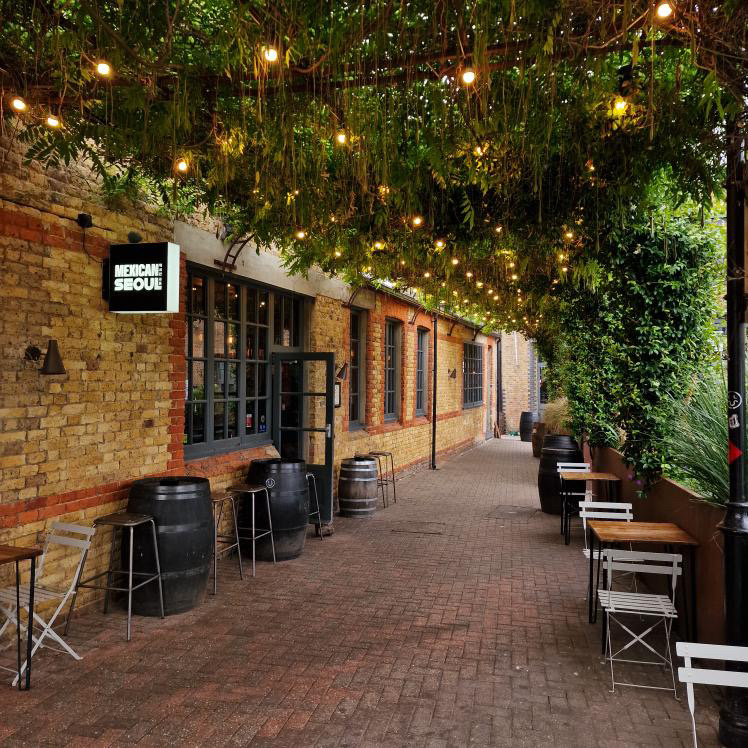Remembering The Backstreet in Mile End: London’s last men-only leather gay bar
East London was once home to a thriving queer nightlife, but soaring costs forced gay landmarks like The Backstreet off the map.
When The Backstreet shut its doors for the last time in July 2022, London lost its longest-running and last men-only leather bar. That summer, gay men lost a club that had felt like home for 37 years.
In its final nights, The Backstreet thronged with visitors from all over the globe. Some travelled from Australia for the chance to party in the notorious fetish venue of head cages and chains one final time.
The legendary club was located in the shadowy backstreet of Wentworth Mews, behind Mile End station. With no outside sign and a no-phone policy, the secretive venue was kept underground despite its explosive popularity.
Walking past the club now, you wouldn’t spare a moment’s glance. Steel shutters border every entrance to discourage squatters, and some haphazard graffiti provides the only sign of remaining life around the vacant building.
But back in the day, Edwards, 70, was the custodian of a vital meeting place, where gay men could seek sex, friendship and belonging without judgment.
Alongside barman Mark Allnutt, 45, Edwards grew The Backstreet into a fabled fetish venue and a community sanctuary. More than a leather and rubber club, The Backstreet was where gay men found peace.
Under threat: Gay nightlife in London
When you think of queer nightlife in our capital, East London might not immediately spring to mind. Though Soho and Vauxhall are celebrated as London’s gay hubs, our neighbourhood was once home to several treasured haunts.
Around Hackney Road, The Nelson’s Head, The George and the Dragon and The Joiners Arms once formed a hub of gay pubs and clubs. Alongside The Backstreet, such places were part of a queer map of East London.
Like countless other much-loved venues, The Backstreet, The George and the Dragon and The Joiners Arms have all shut down due to soaring costs. Since 2006, London has lost 60 per cent of its queer venues, while Tower Hamlets has lost 73 per cent.
When we opened, nothing like gay marriage existed. But when men came into The Backstreet, a few square yards was their space, not anybody else’s.
John Edwards
The Backstreet met this familiar fate when it closed its doors in 2022, but it would have stopped trading as early as 2019 without the unique determination of its regulars to preserve their home. On the closure of gay nightclubs over the years, Edwards said: ‘One was empowered as a community then in a way that one is not now.’
The fight with the property developers
In 2019, developers lost their appeal to build a 12-storey tower block at the club’s location. If planning had been permitted, the residential redevelopment would have exposed The Backstreet to noise complaints which may have forced its closure.
Nigel Whitfield, a Backstreet regular and director of the Breeches and Leather Uniform Fanclub, campaigned to challenge the developers of Galliard Homes. Whitfield mobilised Backstreet regulars, councillors and residents of Tower Hamlets to stand up for the club which was so central to the gay community.
While the developers promised to protect The Backstreet by relocating the club to the tower block’s basement, the preservation of the club’s distinct identity was uncertain.
The campaign to save The Backstreet proved successful, and Tower Hamlets Council ruled against the 46-flat housing scheme. In her ruling against the development, Planning Inspector Julia Gregory said:
‘I am not convinced that the re-provision of The Backstreet club in modern surroundings would amount to a public benefit. Much of the character of the club is gained from the fact that little has changed there for some 30 years.’
Surviving Section 28
Looking further back into British queer history, the club survived the homophobic scrutiny of the 1980s under Margaret Thatcher’s right-wing government. In 1988, Thatcher introduced Section 28, a series of laws that prohibited the ‘promotion of homosexuality’ by local authorities.
Despite the prejudice promoted by Thatcher, The Backstreet kept serving its regulars, providing a community space during a time of no tolerance.
The club is part of Tower Hamlet’s queer history of radical resilience. Throughout the 1980s, the Tower Hamlets Lesbian and Gay Campaign Group passionately campaigned to ‘Stop Clause 28’, while Tower Hamlets Libraries produced a Gay and Lesbian Booklist of 60 titles, defying government calls for censorship.
During the challenges of Thatcher, places like The Backstreet and Globe Town Library were vital refuges for gay men targetted by mainstream politics.
‘It was home for many people. When we opened, nothing like gay marriage existed. But when men came into The Backstreet, a few square yards was their space, not anybody else’s’, Edwards said.
For Allnutt, ‘The Backstreet was more than a home, it was like a form of therapy. It was such a release. It gave people a break from their regular lives to go and do the things that they really loved.’
Living through AIDS
In the 1990s, several members of staff at The Backstreet passed away from AIDS. During the AIDS epidemic, the gay community was constantly mourning, and dealing with mounting homophobia from the media. Newspapers and politicians demonised homosexuality as an illness, blaming gay men for the spread of the disease.
‘Until about 1992, AIDS was a killer. A real, very nasty thing. And we kept it as quiet as it could be.
‘In the early years, I’d say until about 1992, we didn’t know whether we would all die. It was a worrying time’, Edwards said.
AIDS touched The Backstreet intimately. In August 1987, two bar staff passed away within a week of each other. In February 1990, DJ Peter, the club’s first DJ, also passed away.
A meeting place for the gay community became all the more important in these years of painful mourning and rampant homophobia. During this time, The Backstreet was a site of party and protest.
Surviving the pandemic
While the club survived Covid-19, the Backstreet eventually closed due to soaring rental costs like countless other queer venues across London. Edwards said:
‘The reason that we shut down was money. Electricity. Last year, around March, I reckon the amount we spent on electricity in one month was £4000. You could not continue.’
‘Pre-Covid, we were looking at about £400 to £800 a month in electricity, then it just leapt up to that crazy amount’, Allnutt said.
The 2008 recession, Covid-19, and rising energy bills have made survival untenable for LGBTQ+ venues across the capital.
The Backstreet’s Legacy
The Backstreet has joined the growing list of queer venues lost to time, but the Mile End club has a radical history worth remembering.
The club’s themed nights were life-affirming, providing men with a sense of cathartic release when they craved it most. Likewise, when The Backstreet was fighting to survive in 2019, the gay community mobilised to protect it.
Through Thatcher’s intolerance, the AIDS epidemic, Covid-19 and the threat of developers, The Backstreet stood firm. During these rough times, the club and the gay community were each other’s lifeline.
For more about the local queer community, read Fifty years of Pride in Tower Hamlets: How have we changed as a society?

